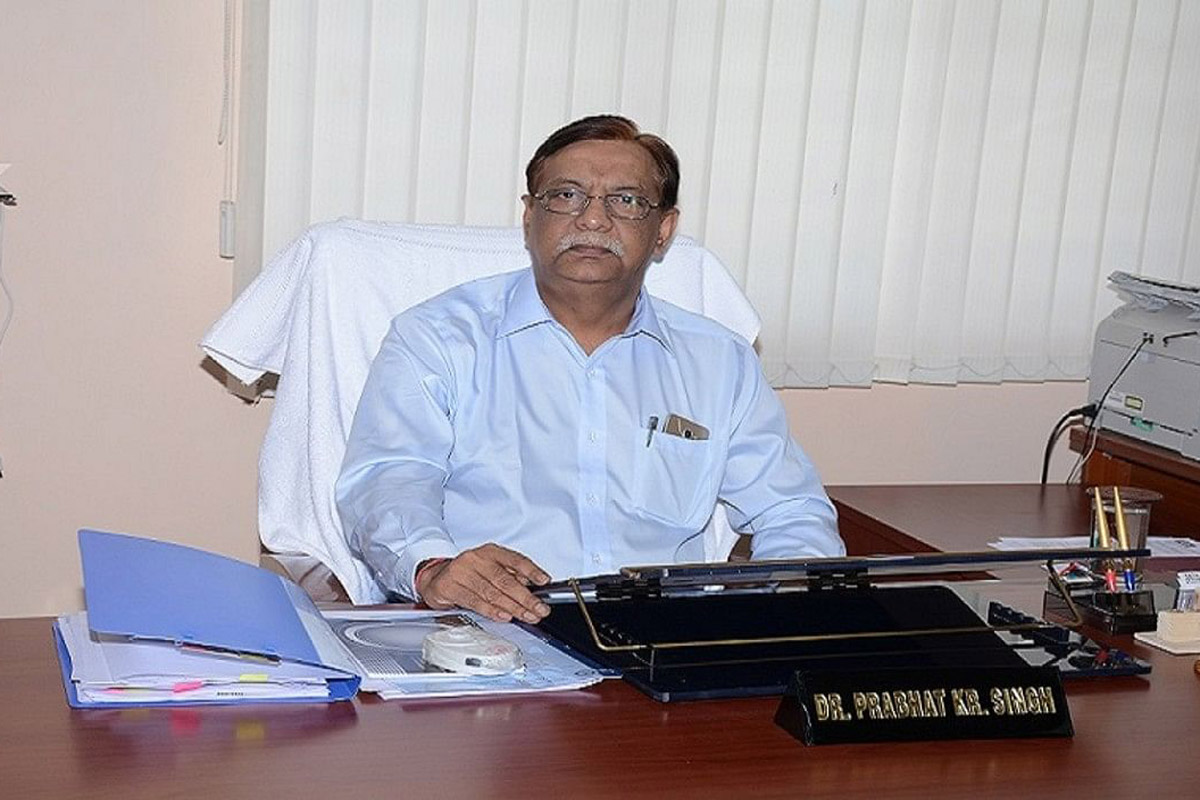26 crore cards created under AB-PMJAY till October 19: Health Ministry
The Ayushman Bharat-Pradhan Mantri Jan Arogya Yojana crossed the milestone of 26 crore Ayushman cards across the country on October 19, the health ministry said on Friday.
We have now 11,600 hospitals empanelled under Ayushman Bharat, so the numbers are increasing. Half of them are private and half are public or government.

Vaccination and community ownership of Covid Appropriate Behaviour (CAB) will not only break the chain of viral transmission but also protect the system from the burden of huge costs and current vaccine demand to vaccinate the whole population of India, says Dr P K SINGH, Director, AIIMS, Patna. Most people, more so in the villages, are still in denial mode; they feel that Covid-19 is nothing to worry about and that they will not get affected, he says in an interview with Ajita Singh. Excerpts
Q: How has the second wave of Covid-19 affected Bihar? How is the situation now?
A: The second wave of Covid-19 was severe. During the first wave, most of the patients came to us from the urban areas, but this time, we had patients from the rural regions too. This wave penetrated the remote villages which were not affected earlier. Last year, there were hardly any cases from Katihar, Raxol, or Purnia, which lie at the Nepal border but this time we got a lot of patients from these places, though places such as Bhojpur, Bhagalpur, Patna, Gaya, Nevada, Begusarai, Shekhpura were affected in the last wave as well. But, now we have less than 90 positive cases per day. The recovery rate, too, has improved to 96.4 per cent.
Q: Do you think lack of non-compliance of Covid-Appropriate behaviour among people was the major reason for this sudden upsurge? How do you think we can help the community adapt to this change?
A: I agree that people are not very particular when it comes to following Covid-Appropriate Behaviour. Most of the people, more so in the villages, are still in denial mode; they feel that Covid-19 is nothing and they will not get affected. People need to understand and be aware of Covid-19 and should follow required precautions so as to avoid getting infected and prevent spread of vaccination.
Advertisement
Q: So, do you counsel the patients who are coming to the institute about the importance of Covid Appropriate Behaviour?
A: Yes, we do counsel patients on CAB. We tell them about the precautions they should take post-Covid-19 infection. We also educate them about how the disease spreads and can affect them and their loved ones if they do not follow Covid Appropriate protocols.
I strongly feel that it is important to study their post-Covid behavior. Right now, we assume that they must be behaving responsibly after having suffered so much in the pandemic. But Covid Appropriate Behavior should be checked and ensured as we can’t rely on assumptions.
Q: What has been the role of the National Health Authority in managing the Coronavirus pandemic?
A: NHA is using its own authentication user agency services with UIDAI. It is using NHA empanelled hospitals for delivery of vaccines since 1 March. Another very important thing is that about 12,000 hospitals are being put to use and they are delivering vaccinations. They are performing quite well.
Their performance is expected to improve in due course of time.
NHA is also issuing digital health IDs to people who are coming for vaccination. It will bring more people into the ambit of the health care that the government provides. People will be able to use the ID systems and it will actually strengthen the national digital health programme.
Q: Is AB involved in vaccine distribution to its beneficiaries?
A: Ayushman Bharat is not playing any role in the vaccination drive. We are involved in developing the software and you know, sort of ensuring that people register on the software, take appointments from the hospitals and get vaccinated. So, this entire lifecycle management is being done by COWIN, the software which we have created.
Q: Has the Ayushman Bharat network been widened to benefit more people?
A: No, it will be widening up. We have now 11,600 hospitals empanelled under Ayushman Bharat, so the numbers are increasing. Half of them are private and half are public or government.
Q: What are the new challenges being faced in the implementation?
A: I think there are no such challenges. I think now the vaccine hesitancy is dwindling, and especially ever since the Prime Minister came forward and actually took the chair on 1st of March. I think that has sent a very strong signal to everybody. His move has been a huge help in this vaccination hesitancy melting away. Now more and more people are coming forward to get vaccinated. Now, there is more demand for vaccines.
Q: Has digitisation in the vaccination drive helped to do away with the complexities that we could have encountered in logistics?
A: We have to maintain details as to when an individual is being vaccinated and why. It is an extremely complex information system to maintain and to scale. We are managing this excellent programme. It involves “creation of our digital backbone”, To support the digital program, we also need a backup and logistics of vaccine movement, cold chain maintenance, and the follow-up of the vaccinated population.
Advertisement